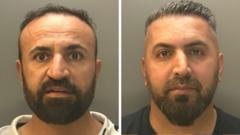In a disturbing twist to the global smuggling crisis, two men from Caerphilly, Wales, have pleaded guilty to their roles in a people smuggling operation likened to a “Tripadvisor for smugglers.” Dilshad Shamo, 41, and Ali Khdir, 40, orchestrated a scheme that brought approximately 100 migrants into Europe weekly over two years, showcasing their services through promotional video reviews and tiered pricing packages. This clandestine operation, presented as a travel agency, highlights the extensive lengths smugglers go to exploit those seeking a better life.
Operating from a car wash, Shamo and Khdir offered various packages categorized as bronze, silver, gold, and platinum, depending on the risk level associated with the migrant's journey. For instance, the platinum plan, which promised air travel and fake passports, demanded prices ranging from £10,000 to £25,000. In contrast, the bronze option, which posed the greatest risk, cost between £3,000 and £5,000, often involving travel hidden in heavy goods vehicles.
The National Crime Agency (NCA) revealed that the majority of clients hailed from Iran, Iraq, and Syria. This smuggling ring not only facilitated dangerous crossings but also garnered positive feedback from migrants, as seen in recorded video reviews where they shared their experiences in lorries and boats. Such endorsements allowed the operation to thrive, likening the smugglers’ tactics to current consumer culture influenced by social media.
Derek Evans from the NCA stated that the smugglers operated under a successful business model that would likely be replaced by others in the market despite their arrest. Investigators identified that the duo employed a hawala banking system to manage their profits, a method permitting money transfers without physical cash flow or stringent personal identification, thus complicating recovery.
Traveling to Erbil in Iraqi Kurdistan, reporters found the hawala system being exploited further by smugglers. Individuals offering to transfer people from France to the UK for hefty fees made their services known through social media platforms like TikTok. The ease of such transactions underscores the need for better regulation of hawala operations and heightened awareness among authorities.
Claire Healy from the UN Office on Drugs and Crime emphasized the legitimate uses of the hawala system but pointed out its attractiveness for criminals. Empirical evidence suggests that while law enforcement can detain low-level operatives, the ringleaders often evade capture. She called for enhanced financial expertise and regulations to disrupt these networks and explore their vast economic implications.
Despite TikTok's pledge against content promoting smuggling and efforts by the UK government to freeze accounts associated with such crimes, challenges remain. These developments raise concerns surrounding international collaboration to better understand and combat this growing industry.
The ripple effects of this case illuminate the vulnerabilities of migrants and the sophisticated networks preying on them, demanding an urgent need for comprehensive solutions to the ongoing smuggling epidemic.




















